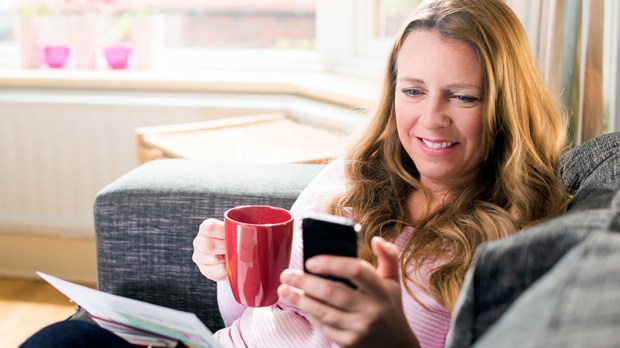Chances are good that you’re reading these words on your digital best friend: the smartphone. Whether you’re in the car waiting for a mud-covered Tommy to finish soccer practice, or grabbing a few spare minutes to gulp down a coffee between meetings, these snippets of time spent on your phone to read or chat with someone are precious. And, thanks to these pocket-sized gadgets, we’re able to jump in and out of our social lives with relative ease, staying connected to friends, family and the rest of the world, while trying to fulfill our numerous roles as best we can.
Of course, there’s a flip side to that: We can also end up relying on our cellphones so much that it obscures our real lives. For many of us, leaving home without a phone gives us palpitations. So where do we draw the line?

Read more:
How to have a healthier relationship with your smartphone
“The trajectory of my waking hours is different as a stay-at-home mom. I’m not conversing with adults regularly, if at all, and my only company is a wild toddler that I can barely contain, a teething baby, and a dog.” She goes on to explain how her new stay-at-home life has led to feelings of social isolation and loneliness: “Even a conversation in the checkout line feels so good right now.”
Although being with our kids is both a privilege and a blessing, we all have times when we need to reach out to others. The virtual support system of moms’ groups online offered Jessica reassurance, telling her it’s perfectly normal for a baby to spit out veggie meals we so lovingly prepared, or the best way to get rid of permanent marker wall art. As Jessica says: “Online moms’ groups were my lifeline … These women have quite literally changed my life in both large and subtle ways, even though we can’t spend much time together in person … they truly understand the path I’m walking.”
Read more:
When my husband ignores me for his smartphone, I call on Mary
These, however, are benefits that her working husband may not be aware of, simply because he can’t know what it feels like to be a SAHM: “What you don’t realize … is … how hard it has been for me to adjust to this new life, this new role, and how inadequate I sometimes feel at it. It’s nice to be told that I’m doing a good job, and I need to hear these things from an outsider — from my virtual village.”
From Jessica’s point of view, her smartphone is not an addiction, but an anecdote. She is adapting to an era wheres sometimes we can’t physically see our relatives, friends or mentors much, but can still experience their support or heed their advice from afar. And a work-outside-the-home mother might see a similar benefit from her phone, using it as a way to stay in the loop even when she can’t physically be with her kids.
So maybe we shouldn’t be quite so quick to judge our wives, or other moms, and instead use the time to reflect on our own smartphone usage, asking: Am I using this phone to escape my day, or help me through it?

